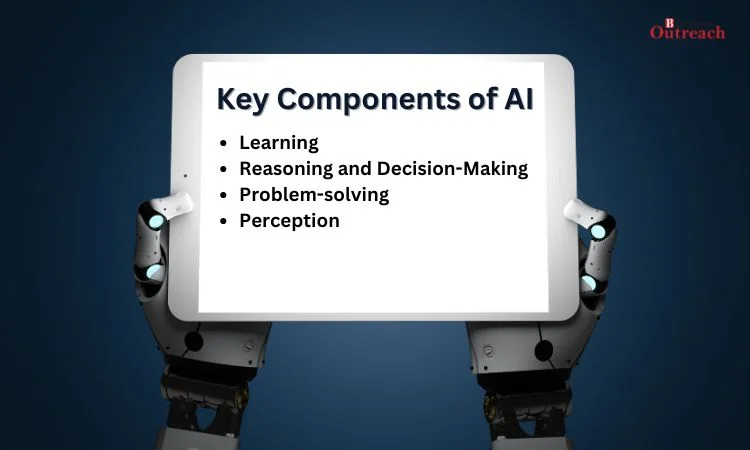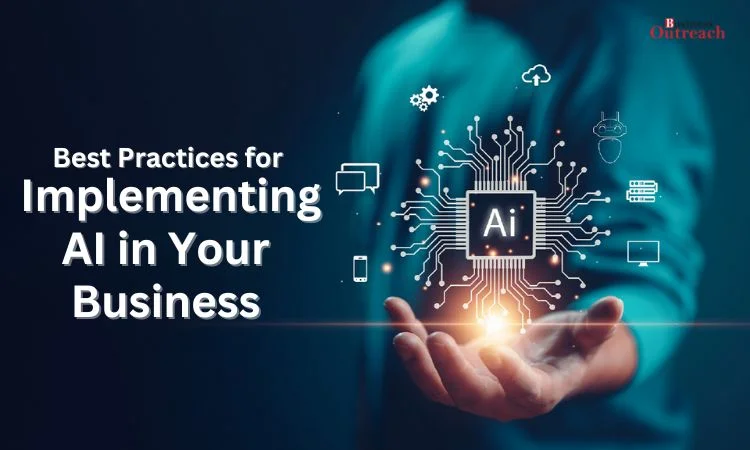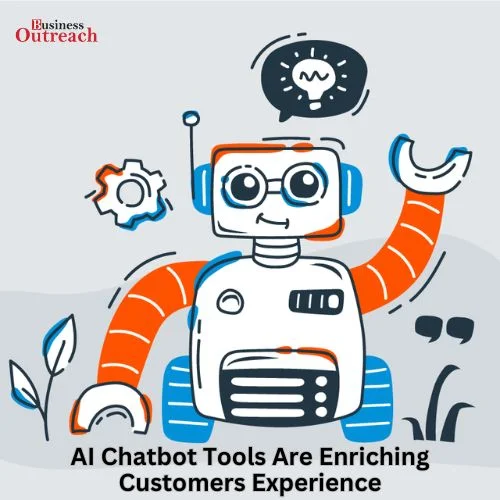In modern days of technological advancement artificial intelligence has emergeed as a strong tool for businesses focusing on enhancing operations, enhancing decision-making ability, and innovating their products and services. Implementing AI with successful results requires careful planning, strategic alignment, and adherence to best practices. Whether you are a startup venturing into AI or a well-renowned enterprise scaling AI initiatives, we will explore the depth of ten best practices to guide you through the process.
| Table of Contents | |
| 1 | 10 best practices for implementing AI in your business |
| 2 | Definition of AI and its key components |
| 3 | Key Components of AI |
| 4 | 10 best practices for implementing AI in your business 1- Identify clear objectives 2- Quality and Accessible Data 3- Opting right AI tools and platforms 4- Concern for security and privacy 5- AI should be transparent and explainable 6- Apply iterative testing and improvement 7- Collaboration with different units 8- Invest in employee training and upskilling 9- Ethical consideration 10- Scalability Plan |
| 5 | Examples of AI applications in business |
| 6 | Conclusion |
Definition of AI and its key components

Artificial Intelligence is the intellect of technical machines or computers that makes it able to imitate or mimic human capabilities.
AI is a special technology mindset that tries to match the quality of human brains. It uses different modes of technologies that equip machines to feel, comprehend, plan, act, and learn with the intelligence of human-like behaviour. AI is used to enhance the ability of technology to perceive environments, identify objects, enhance decision-making ability, solve processes, learn from past experiences and imitate patterns.
Key Components of AI

AI has transformed businesses with multiple capabilities and some key components are listed below-
Learning
It can be said that learning is a crucial component of AI and it enables AI systems to learn from the given data and improve their performance without being fragrantly programmed by humans.
Reasoning and Decision-Making
This is the second most important component of AI as it uses logical rules, different models, and advanced algorithms to draw any conclusion and make inferred decisions.
Problem-solving
Problem-solving is an important component of AI that looks similar to the decision-making ability and solves a specific problem.
Perception
This is the 4th component of AI and is also considered to be the most important one. This perception can be assumed as AI utilising different real or artificial sense organs. The AI intelligence will predict the conclusion based on the data available in the database like distance.
10 Best Practices for Implementing AI in Your Business

1- Identify clear objectives
Applying AI starts with clearly understanding what you are focused on achieving. This could be started by searching the possible ways and places AI can add significant value. Anything, that has a strong need for such innovation, like optimization of the supply chain, automating routine tasks, evaluating customer behaviour or increasing product recommendations, identifying clear goals helps focus efforts and measure outcomes effectively. A company based on retail marketing might fix a goal to enhance online sales by 20% through implementing AI-driven recommendations.
2- Quality and Accessible Data
Data is the base of the power of artificial intelligence. To achieve meaningful insights and predictions data must be clean, appropriate, and accessible. Conduct a surface audit of existing data sources, revealing issues like data quality, consistency, and completeness. It is important to apply robust data governance practices to maintain data trust over time.
The process includes the cleaning of the data, normalization, and establishing etiquetes for data access and security. It is ensured that the accessibility of data enables AI models can leverage the right information to provide accurate and actionable insights.
3- Opting right AI tools and platforms
This is also one of the crucial for the success of your initiatives that businesses should be selecting appropriate AI tools and platforms. This AI automation helps to get scalability, ability, existing IT infrastructure, and ease of integration. businesses can evaluate technology like machine learning frameworks example PyTorch, TensorFlow, or useful AI platforms that are being offered by cloud providers such as AWS, Azure or Google Cloud. It is advisory for all businesses to adopt technologies that are helping in revenue enhancement and align your business needs and capabilities further confirming such technology can support current and future AI applications.
4- Concern for security and privacy
AI implementation involves the part of mobilising sensitive data which is necessary to check from all aspects that involve its security and privacy critical consideration. While dealing with the AI data implementation it is important to apply massive security measures to enhance the protection and integrity of data.
The security norms may include encryption of data in both cases like in rest and transit, Provide access and controls based on the available latest security audits. Your data should comply with data protection regulations like CCPA, GDPR, or other industry-important standards. Enhancing the security measures with your data system will increase the trust among customers and stakeholders on the same hand decreasing risks associated with AI implementation.
5- AI should be transparent and explainable
Working in any business model that connects with society demands some great percentage of transparency and explanation to your customers hence it is necessary to build transparency and explainability in AI-driven decisions and ensure regularity compliances. It is safe to make everything documentation like data sources, AI processes, and algorithm choices.
Everything should be clear with all stakeholders about the capability of that AI system introduced in working businesses like AI predictions, capabilities, limitations, and potential biases in a clear perspective and understandable manner. Continuous checking the AI decisions and predictions is very important hence implementing mechanisms and auditing and reviewing its decisions to maintain fairness, trustworthiness and compliance with ethical standards.
6- Apply iterative testing and improvement
The nature of AI depends on the data it takes and keeps itself updated with the latest trends in the market hence it is essential to keep the AI system most evolved. By implementing a structured process it will get iterative testing, validation, and improvement of AI models.
Introduce your performance metrics and benchmarks aligned with the goals set in your business. Also, the business owner must ensure to check the AI system that is revealing the present scenario data as per its needs and have the feedback system to get the feedback space to continuously refine its algorithms and increase its model accuracy. This form of iterative testing and improvement helps the business to follow the latest trends in the market world.
7- Collaboration with different units
AI tools and platforms are fostering the growth of businesses and successfully running the Artificial Intelligence strategies may demand some collaboration with different departments and stakeholders involved with your organisation. It is important to keep active with the relationship of data scientists, business units, legal experts, and end users from the outset of your AI journey.
Make a prolific culture among your business groups to be collaborative and open communique which will help to align AI initiatives with strategic business objectives. Every member involved in the process of this implementation of AI strategy should be clear with their contribution and commitment. Connecting with several teams involved in the implementation of AI boosts the quality of your AI projects and drives industrial success.
8- Invest in employee training and upskilling
Make sure all your employees are equipped with the latest trends of the AI system hence it is required to take a long research and update the social security measures. Businesses should provide the required training in their working abience to their all working force by the AI upskilling. It is also necessary to provide hands-on experience in some of the live projects to deepen the understanding and proficiency.
Companies should empower the workforce by providing the required skills needed to align themselves with the latest trending world.
Investing in your employee capability and AI-based teaching including the practicals will help you to enhance the company’s growth and its valuation.
9- Ethical consideration
AI technology comes with different biased theories about predicting the future and revealing the most clear present need some standards of ethical rules that work for fairness, accountability, and societal impacts. businesses need to develop some clear guidelines and rules for AI development and deployment within their organisation. A team should always conduct thorough research to identify and mitigate data collection, algorithm designs and decision-making processes.
Introduce the concern with the stakeholders, ethics communities, industry experts, and representatives of the community to suggest broader aspects of AI technology in the world.
Introducing the ethical aspect of using the most advanced technology will help to generate trust among your stakeholders and customers.
10- Scalability Plan
Businesses must have long-term scalability of their AI solutions to support the growth of their business and focus on expansion. Know the anticipation of data volumes, user demands, and technical advancements. One should opt for scalable architecture and solutions based on cloud technology that can accommodate enhancing AI applications and computational requirements. It is important to have a roadmap for scaling the future growth of the business using AI initiatives based on business objectives, market trends, and emerging opportunities.
Making continuity to enhance performance, efficiency, and reliability it is necessary to optimize your AI infrastructure.
Examples of AI applications in business
Many examples will explain the application of AI in the business world, some of them are listed below-
* Customer service (chatbots)- One of the most effective examples of an AI application is the empowering customer service using the instant chats (chatbots) available 24X7.
* Data analysis and insights- Another important application of AI is providing crucial data analysis and insights to businesses by attracting, analysing, and implementing data in their business careers.
* Automation of routine tasks- Where AI applications are continuously introducing innovative solutions to the business world there is an important application that can be seen in the performing tasks which are a part of automation of routine tasks. AI can perform routine tasks and automation with the help of AI intelligence.
Conclusion
Using Artificial Intelligence for your business growth requires a strategic and holistic approach that integrates technical expertise, organizational alignment, and ethical consideration. In today’s scenario, businesses could achieve sustainable growth by harnessing the transformative power of AI to drive innovative steps and increase operational efficiency. AI will act as a catalyst for change and unlock the superpowers of your organization’s journey that will impact the stakeholders and its customers.















